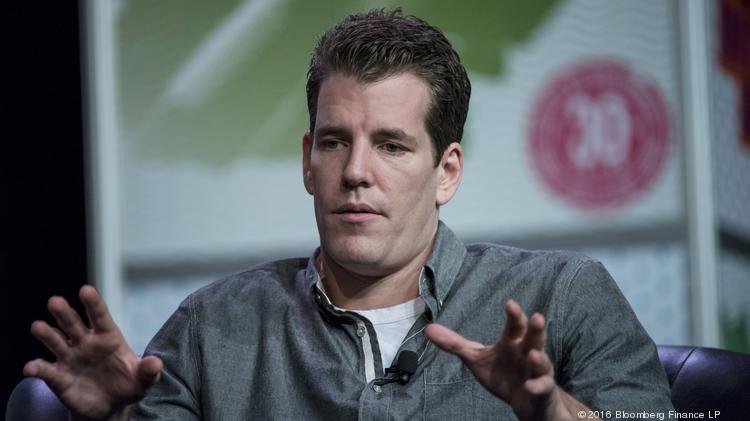Tyler Winklevoss talks bitcoin: ‘Running a marathon, not a sprint
By
Tyler and Cameron Winklevoss were on vacation in Ibiza, and they couldn’t pay for their hotel. The problem wasn’t funds — the twin brothers, of course, had received a large legal settlement for their involvement with the founding of Facebook and gone on to successful rowing and investing careers.
The problem was how hard it is to move money around internationally; it can be faster to physically FedEx a checkbook across the world than to send money via a wire transfer, says Tyler.
They got the payment sorted out, but it led to a growing interest in money transfer technology. After some investments during bitcoin’s “Wild West” early days, Tyler and Cameron set out to find a safe, secure place to make bitcoin investments, eventually deciding to try and solve the problem themselves by founding Gemini, one of the earliest fully regulated bitcoin trading exchanges.
Speaking to us as Consensus 2016: Making Blockchain Real conference in New York City kicks off, Tyler talks about his path from entrepreneur to Olympic rower and back again, the difficulty of translating the disruptive experimental nature of a tech startup culture to heavily regulated fields like finance, and how finding a good investment idea can be like finding the love of your life.
(The full interview can be found on the Numbers & Narrative podcast, which you can listen to below. It has been edited here for clarity and length.)
You are an entrepreneur and investor based in New York City. Can you describe what’s happening at your office?
We’re in the Flatiron district, in the Winklevoss Capital office space, which used to incubate tech companies in San Francisco that we’d invested in that then opened operations in New York. When Cameron and I decided to become entrepreneurs again and build our bitcoin exchange, called Gemini, we started here. We began with one desk and now it’s taken over the whole space, so the Winklevoss Capital headquarters have slowly been absorbed by Gemini bitcoin exchange. We still continue angel investing with Winklevoss Capital, where we’ve kept our 50 or so portfolio companies going strong, but our day-to-day focus is now on Gemini.
How does Gemini work?
Gemini is a spot bitcoin exchange. To use it, you sign up with Gemini.com and undergo the initial standard review process similar to what you’d encounter at a traditional bank. Once you’re through, you can ACH or wire cash to the platform, then begin buying and selling bitcoin.
How is Gemini different from other bitcoin exchanges?
We describe ourselves as a NASDAQ for bitcoin. That is, we operate similarly to the way that you might normally purchase securities and open a brokerage account. We also have a web interface, so we’re like an E-Trade.
How did your first investments in bitcoin influence Gemini?
In our early experiences with bitcoin, we found how few people were building bitcoin exchanges the right way. They really weren’t taking the regulation seriously; they were taking it too much like how you would approach something when you’re 18, full of the excitement of youth and throwing caution to the wind. We were passive investors in a bitcoin company whose CEO went to prison for laundering, which was a valuable lesson for us, because it showed us how to do this the right way.
Since that experience, we’ve taken considerable steps to ensure a higher standard of care. We’ve created a great security system that essentially acts as a more effective form of insurance. We’re licensed by the New York Department of Financial Services, which is the highest regulator in the land for both banks and insurance companies in New York. We have bank exams every six to twelve months, which is a very rigorous process. We want to look and feel just like your other financial service companies, so we spent a lot of time ensuring that we do this the right way.
How did you first become interested in bitcoin?
We found bitcoin of all places on an Ibiza vacation in the summer of 2012. Paying for accommodation was really difficult when we got there. Apparently we were short some money, so we had to go through the process of wiring it. And, of course, you can’t put your accommodation on hold for the money to get there, because it takes five days and the vacation is over by then.
We know how easy it is to send an email, and moving money should be able to be as efficient as sending email. These ideas often hit in the same way that relationships do. You can’t force or will your way into falling in love or finding the right person, it just happens, when you least expect it. So, we weren’t looking for bitcoin, but we found it, and we were fascinated by its elegance.
Startups tend to be experimental, operating with a fast and loose approach. How do you reconcile that culture with the stringency of finance?
[There’s an attitude of] “Let’s hack, let’s hack a way through it,” and we try and do that where we can, but we certainly don’t want to do that with storing your bitcoin. There are parts of the product that we can approach with that experimental attitude, but we’d rather be conservative and build a long-term, sustainable business. We’re running a marathon, not a sprint. You can lead the New York marathon for 20 paces, but we want to be there for the long run. We’re encumbered in ways that pure tech startups are not, because of the financial nature of our work.
Whereas most startups only deal with product, our business deals with security, regulation, and licensing in addition to our product. Others can afford to make mistakes in ways that we can’t. We have to convince regulators, banks, and customers that we’re reliable and secure, and then we have to create a cool product. There’s a tension in the fin-tech world between adhering to regulation while avoiding the tendency to perfect things so much that you don’t move at the pace of technology.
You seized upon a fairly random idea in Ibiza and turned it into a company. Is that typical of your approach?
Actually, our path to Gemini resembled our path to the Olympics in that sense. We didn’t grow up in a jock household. In fact, my dad is an entrepreneur. He was a computer programmer, he was a professor of actuarial science at Wharton for 13 years, then started his own company that was software-based. So, as kids, we would go to his office and play with computers, and were fascinated with technology, and we would look at business magazines, and our role models were guys like Bill Gates and Steve Jobs, the classic role models if you were into technology.
And then we found rowing. We were tall and some family friends said “Maybe you should try….” And “let’s try this” led into a 15-year detour and going to the Olympics. And it sounds kind of funny, but when you talk to other Olympic athletes, that’s how it starts: “My friend dragged me to soccer practice or gym practice, and next thing I knew I liked it, I had a knack for it, it was the first time I felt really engaged with something.”
When we first tried rowing, we didn’t know if we liked it or would be good at it. It was just a matter of having fun the first day, then doing okay in a race a month later, and thinking we could do better the next time. It’s the little goals and little things along the way. I think our path to the Olympics is a good metaphor for how you build a company. Our skill and commitment grew over time, day by day, stroke by stroke. So, sports are tied well with our entrepreneurial pursuits, because you train for a few years, but there is no guarantee that you will succeed.
Are you mostly bitcoin-focused, or are you looking for other ways that technology can go into the future with this?
I do think that the legacy banking sector needs to up their game and get better, but that is not a sandbox where people will build applications that will change the world as dramatically as the [blockchain and bitcoin] system. So there are areas of the financial sector that should improve their technology, but a blockchain between just a certain number of banks is very different from the bitcoin blockchain itself, which is open, like the internet is open.
We’re really focused on building that side of things, which is the open, immutable, trustless record that is borderless and which no government really controls. We’re interested in that world.
Renny McPherson, an entrepreneur and investor, is a managing partner at N2 Communications. He is the co-author of ” Entrepreneurs in the Midst: Stories from Founders, Creators, and Builders .” He is the cofounder of the podcast Numbers & Narrative


